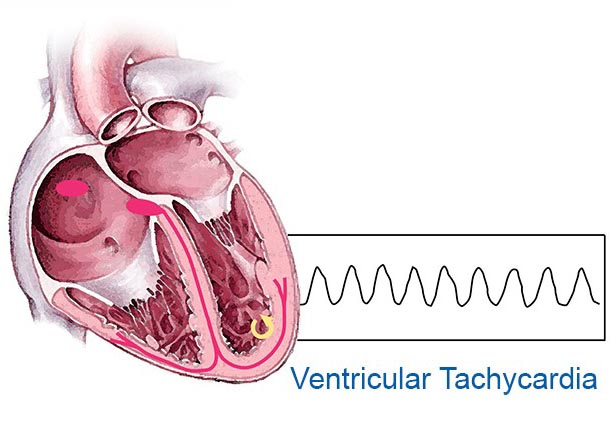A new genetic discovery in COVID-19 complications - the role of Ankyrin-2 in ventricular tachycardia
Nikhil Prasad Fact checked by:Thailand Medical News Team Jul 22, 2024 1 year, 5 months, 3 days, 5 hours, 13 minutes ago
COVID-19 News: In the ongoing battle against COVID-19, scientists have uncovered numerous complications associated with the virus, ranging from respiratory issues to severe cardiovascular problems. Among the most alarming of these is myocarditis, an inflammation of the heart muscle, which can lead to dangerous heart rhythms such as ventricular tachycardia (VT). This
COVID-19 News report delves into a recent case study by researchers from Burnett School of Medicine at TCU, Texas-USA that highlights a potential genetic link influencing these severe cardiac events in COVID-19 patients.
 A new genetic discovery in COVID-19 complications - the role of Ankyrin-2 in ventricular tachycardia
Case Report
A new genetic discovery in COVID-19 complications - the role of Ankyrin-2 in ventricular tachycardia
Case Report
The study in focus is a detailed report on a 53-year-old woman with a history of Crohn’s disease and asthma who developed severe heart complications following a COVID-19 infection. After recovering from the initial infection, she began experiencing chest pressure, palpitations, and shortness of breath. Medical evaluations revealed that she had developed myocarditis complicated by recurrent ventricular tachycardia, a condition where the heart beats abnormally fast.
Genetic Insight
In an attempt to understand the underlying cause of these complications, genetic testing was conducted. The results were groundbreaking: a single nucleotide variant (SNV) in the ANK-2 gene, known to be associated with an increased risk of arrhythmias, was identified. This discovery sheds light on how genetic predispositions can influence the severity of COVID-19 complications.
Detailed Findings
The genetic mutation found in the patient was a novel variant, c.3074G>C, leading to a glycine to alanine amino acid change in the ANK-2 gene. Ankyrin-B, the protein encoded by ANK-2, plays a crucial role in regulating ion channels in heart cells, including those for potassium, sodium, and calcium ions. Disruptions in these channels can lead to prolonged QT intervals and increase the risk of arrhythmias.
Treatment and Outcome
The patient was initially treated with flecainide, an anti-arrhythmic drug, but continued to experience severe symptoms. Upon referral to a specialized program, her treatment was adjusted to include mexiletine, a Class IB anti-arrhythmic drug, and a low-dose beta-blocker. This combination effectively managed her ventricular tachycardia, leading to significant improvement.
Six months into the treatment, follow-up tests showed the resolution of myocarditis and normalization of the QT interval, indicating that the heart's electrical activity had stabilized. The successful management of her condition underscores the importance of personalized treatment approaches, especially when genetic factors are involved.
Understanding Ankyrin-2
Ankyrin-B, a protein influenced by the ANK-2 gene, is integral to the heart's electrical signaling. It ensures that sodium/calcium exchan
gers and other vital proteins are correctly positioned in the heart cells. Mutations in ANK-2 can disrupt this delicate balance, leading to arrhythmias. The specific mutation found in this case, G1025A, is suspected to have exacerbated the patient's condition during her bout with COVID-19.
Implications for Future Research
This case study emphasizes the need for further research into the genetic factors influencing COVID-19 complications. Understanding these genetic links can help develop more effective treatment strategies and potentially predict which patients are at higher risk for severe outcomes.
Conclusion
The study provides compelling evidence of a genetic link between the ANK-2 gene and severe cardiac complications in COVID-19 patients. The findings highlight the importance of considering genetic predispositions when diagnosing and treating COVID-19-related myocarditis and ventricular tachycardia.
The study findings were published in the peer-reviewed journal: Cardiogenetics.
https://www.mdpi.com/2035-8148/14/2/7
For the latest
COVID-19 News, keep on logging to Thailand Medical News.
Read Also:
https://www.thailandmedical.news/news/postural-orthostatic-tachycardia-syndrome-pots-linked-to-sexual-dysfunction
https://www.thailandmedical.news/news/covid-19-news-researchers-warn-that-unique-types-of-sars-cov-2-related-arrhythmias-known-as-fascicular-tachycardia-are-materializing-in-children
